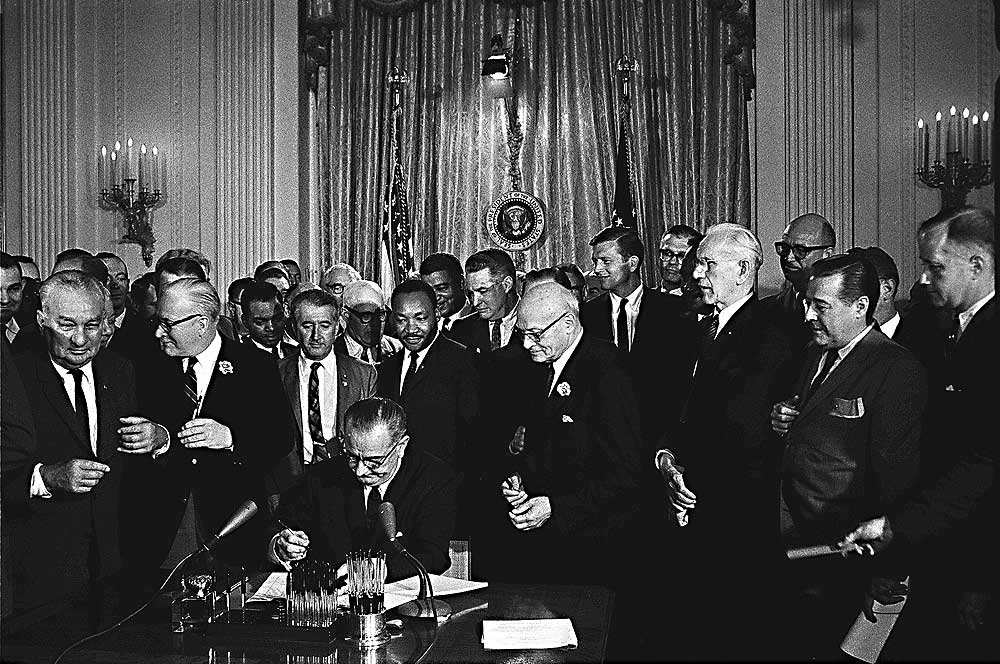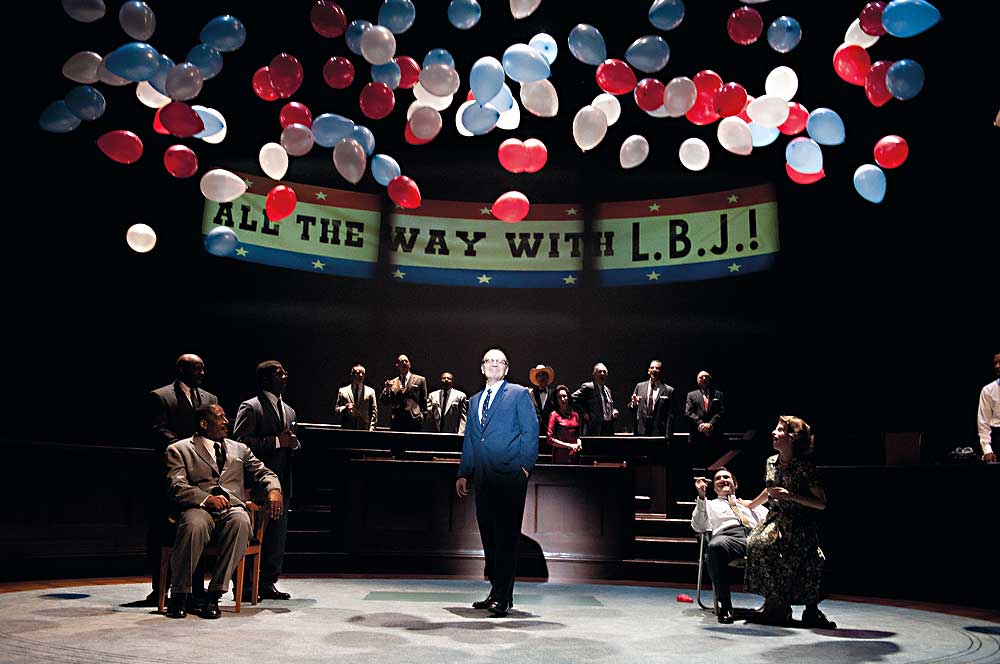When it came to her desk, ART artistic director Diane Paulus was quickly captivated by Schenkkan’s script for All the Way. “What impressed me is that the play is more relevant than ever, especially with the recent Supreme Court ruling that strips away parts of the Voting Rights Act. I’m always looking for work that’s a catalyst for a larger discussion, debates, ideas—plays that become events that literally explode off the stage and ignite a dialogue in the audience. This play does that so powerfully.”
Larry Temple, the chairman of the Lyndon Baines Johnson Presidential Library and a former White House counsel to LBJ from 1969 to 1971, has also read All the Way, and concurs. “I think it’s very timely, what the play shows. There still are civil rights issues in this country. We’ve made enormous progress, but it doesn’t mean we’ve gotten across the line. There’s still a lot of work to be done.”

A QUEST FOR PUBLIC DIALOGUE AND INDIVIDUAL SOUL-SEARCHING underpins much of Schenkkan’s writing, as does an undisguised ethical inquiry in relation to history and personal morality. It is not the trendiest of theatrical directions. And it is fitting that, when he names the American dramatists who have influenced him most, Eugene O’Neill and Arthur Miller top the list. In fact, some of the criticisms Schenkkan’s plays have engendered, particularly his early dramas, are similar to complaints leveled at those writers. The impassioned monologues and fervent dialogue in Schenkkan scripts can at times feel preachy and ring rhetorical. And his narratives (as Frank Rich complained in his harsh review of the 1992 Broadway production of The Kentucky Cycle), while richly plotted, can veer toward melodrama.
But Rauch, who previously staged at OSF the premieres of Schenkkan’s Handler (about a born-again ex-convict’s alleged death and resurrection within a snake-handling Christian cult) and By the Waters of Babylon (which telescopes a romance between the survivor of a brutally abusive marriage and a Cuban immigrant long tormented by survivors’ guilt), finds the moral quandaries in Schenkkan’s body of work sincere, compelling and bracing, as well as valuable. “He’s a big and deep thinker, fearless in his willingness to put the truth as he sees it onstage, and he’s unafraid of a big canvas of people and ideas. He’s interested in the promise of this country, and how we fail to realize that promise,” contends Rauch.
Since initiating the American Revolutions project, Rauch and OSF have commissioned 21 historically based plays, including Ashland premieres about the Black Panther Party (Party People byUNIVERSES), the early American slave trade (The Liquid Plain by Naomi Wallace) and a son haunted by the assassination of his politician father (Ghostlight by Tony Taccone). “When I asked Bob if he had any ideas for the cycle, he immediately suggested LBJ,” recounts Rauch, “and that interested me right away.”

Schenkkan is no novice at translating historical realities into absorbing semi-fictions. He jokes, “I’ve become kind of the go-to guy for period and epic drama,” and his film résumé backs that: Schenkkan penned Crazy Horse, the Ted Turner–produced bio-film about the legendary Native American warrior of the title. He chronicled ancient Rome in a recent cable-TV version of “Spartacus.” And he thoroughly researched aspects of World War II as a co-producer and Emmy-nominated scriptwriter for “The Pacific” mini-series.
Schenkkan also received an Academy Award nomination, with Christopher Hampton, for co-writing the 2002 film The Quiet American, based on Graham Greene’s prescient novel about the early U.S. involvement in Vietnam. And he began examining the Johnson presidency while working with acclaimed MLK biographer Taylor Branch on a TV series based on Branch’s book, America in the King Years. (Though Schenkkan wrote drafts of the screenplay for Oprah Winfrey’s Harpo Productions, that project is currently stalled.) “After an almost two-year immersion in that era, I had a very solid grounding in the history of the Civil Rights Movement,” the writer says.
But he also drew inspiration from a more personal connection to Johnson, which helped him better comprehend the late president’s manner, his mindset and his outsized ambitions. Schenkkan, who had a busy career as a stage and TV actor in the ’70s and ’80s before making it as a playwright, grew up mainly in Austin—the Texas state capital and a city that considers LBJ a favorite son, and where the president’s father, Sam Ealy Johnson Jr., also a populist Democrat, served six terms in the Texas State Legislature.
Johnson was reared in the nearby Texas Hill Country, keenly aware of the area’s desperate poverty, which affected his decision to teach public school, and later to run for political office on a platform committed to furthering the New Deal social welfare policies of Franklin D. Roosevelt. In contrast, Schenkkan grew up in a more prosperous academic environment—but he was quite familiar with the colorful Hill Country vernacular, and also well aware of America’s less privileged citizens. His father,Robert F. Schenkkan Sr., was a respected public broadcasting pioneer, and a professor of communications at the University of Texas–Austin. And back when Johnson was owner of a media mini-empire of commercial TV stations in the state, the elder Schenkkan had direct dealings with him.





